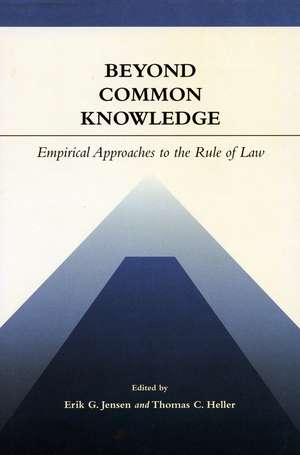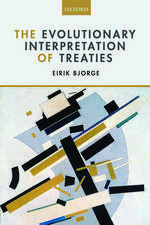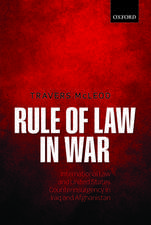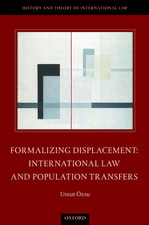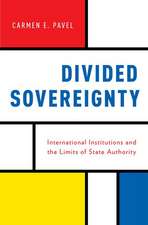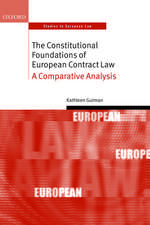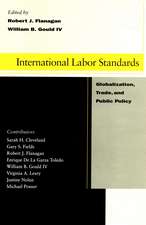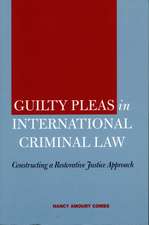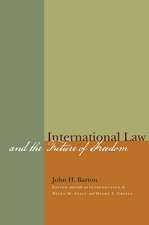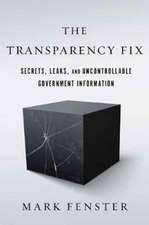Beyond Common Knowledge: Empirical Approaches to the Rule of Law
Editat de Erik Jensen, Thomas Helleren Limba Engleză Paperback – 14 noi 2005
An intensive global search is on for the "rule of law," the holy grail of good governance, which has led to a dramatic increase in judicial reform activities in developing countries. Very little attention, however, has been paid to the widening gap between theory and practice, or to the ongoing disconnect between stated project goals and actual funded activities.
Beyond Common Knowledge examines the standard methods of legal and judicial reform. Taking stock of international experience in legal and judicial reform in Latin America, Europe, India, and China, this volume answers key questions in the judicial reform debate: What are the common assumptions about the role of the courts in improving economic growth and democratic politics? Do we expect too much from the formal legal system? Is investing in judicial reform projects a good strategy for getting at the problems of governance that beset many developing countries? If not, what are we missing?
Beyond Common Knowledge examines the standard methods of legal and judicial reform. Taking stock of international experience in legal and judicial reform in Latin America, Europe, India, and China, this volume answers key questions in the judicial reform debate: What are the common assumptions about the role of the courts in improving economic growth and democratic politics? Do we expect too much from the formal legal system? Is investing in judicial reform projects a good strategy for getting at the problems of governance that beset many developing countries? If not, what are we missing?
Preț: 269.07 lei
Nou
Puncte Express: 404
Preț estimativ în valută:
51.52€ • 53.09$ • 43.24£
51.52€ • 53.09$ • 43.24£
Carte disponibilă
Livrare economică 31 ianuarie-14 februarie
Preluare comenzi: 021 569.72.76
Specificații
ISBN-13: 9780804748032
ISBN-10: 0804748039
Pagini: 456
Dimensiuni: 152 x 229 x 25 mm
Greutate: 0.61 kg
Ediția:1
Editura: Stanford University Press
Colecția Stanford Law and Politics
ISBN-10: 0804748039
Pagini: 456
Dimensiuni: 152 x 229 x 25 mm
Greutate: 0.61 kg
Ediția:1
Editura: Stanford University Press
Colecția Stanford Law and Politics
Recenzii
"This volume should be mandatory reading for the directors of multilateral development banks, practitioners, scholars, policymakers, and others who hope that reform of the formal justice system will bring about political and economic liberalization."
—Paul Brest, President, William and Flora Hewlett Foundation and Dean, Stanford Law School 1987-1999
—Paul Brest, President, William and Flora Hewlett Foundation and Dean, Stanford Law School 1987-1999
"The chapters in this volume challenge the rule of law orthodoxy and introduce a much more textured account of the shifting and varying roles of formal and informal institutions that perform legal functions across countries, exploring the variegated micro-foundations of the rule of law. No scholar or policy maker should utter the words 'rule of law' without first reading this volume."
—Joseph Stiglitz, Columbia University, former Chief Economist for The World Bank, and Nobel Laureate
—Joseph Stiglitz, Columbia University, former Chief Economist for The World Bank, and Nobel Laureate
"Beyond Common Knowledge is a call to arms, to save judicial reform programming from a passionate commitment to its goals that has blinded too many of its practitioners to lessons—drawn from recent experience and scholarship—about the complex dynamics of institutional reform."
—Barry Metzger, Senior Partner, Coudert Brothers LLP and formerly General Counsel, Asian Development Bank
—Barry Metzger, Senior Partner, Coudert Brothers LLP and formerly General Counsel, Asian Development Bank
"Beyond Common Knowledge presents a wealth of new material on legal institutions in developing and post-socialist countries. No other book contains such a rich combination of description and analysis. It is an important contribution to literature on legal and judicial reform."
—Richard E. Messick,
Co-Director, Legal Institutions Thematic Group, The World Bank
—Richard E. Messick,
Co-Director, Legal Institutions Thematic Group, The World Bank
"This book deserves attention as one of the most serious efforts to date to grapple with the rapidly growing field of rule-of-law development." —Thomas Carothers, Carnegie Endowment for International Peace
"This collection serves as a refreshing antidote to the boosterism of the 'rule of law,' world peace through law,' and 'international human rights law' entrepreneurs. It should be mandatory reading for any law professor embarked on an international consultation project, or establishing a development internship programme, or called upon to advise governments and development agencies."—Canadian Journal of Law and Society
"The essays are all thought-provoking, and in some cases really excellent. And importantly, they add to the very limited stock of published and accessible empirical data on world legal systems."—Law and Politics Book Review
"This collection serves as a refreshing antidote to the boosterism of the 'rule of law,' world peace through law,' and 'international human rights law' entrepreneurs. It should be mandatory reading for any law professor embarked on an international consultation project, or establishing a development internship programme, or called upon to advise governments and development agencies."—Canadian Journal of Law and Society
"The essays are all thought-provoking, and in some cases really excellent. And importantly, they add to the very limited stock of published and accessible empirical data on world legal systems."—Law and Politics Book Review
Notă biografică
Erik G. Jensen is Co-Director of the Rule of Law Program at Stanford Law School. Thomas C. Heller is Lewis Talbot and Nadine Hearn Shelton Professor of International Legal Studies at Stanford Law School.
Textul de pe ultima copertă
“This volume should be mandatory reading for the directors of multilateral development banks, practitioners, scholars, policymakers, and others who hope that reform of the formal justice system will bring about political and economic liberalization.”
—Paul Brest, President, William and Flora Hewlett Foundation and Dean, Stanford Law School 1987-1999
“The chapters in this volume challenge the rule of law orthodoxy and introduce a much more textured account of the shifting and varying roles of formal and informal institutions that perform legal functions across countries, exploring the variegated micro-foundations of the rule of law. No scholar or policy maker should utter the words ‘rule of law’ without first reading this volume.”
—Joseph Stiglitz, Columbia University, former Chief Economist for The World Bank, and Nobel Laureate
—Paul Brest, President, William and Flora Hewlett Foundation and Dean, Stanford Law School 1987-1999
“The chapters in this volume challenge the rule of law orthodoxy and introduce a much more textured account of the shifting and varying roles of formal and informal institutions that perform legal functions across countries, exploring the variegated micro-foundations of the rule of law. No scholar or policy maker should utter the words ‘rule of law’ without first reading this volume.”
—Joseph Stiglitz, Columbia University, former Chief Economist for The World Bank, and Nobel Laureate
